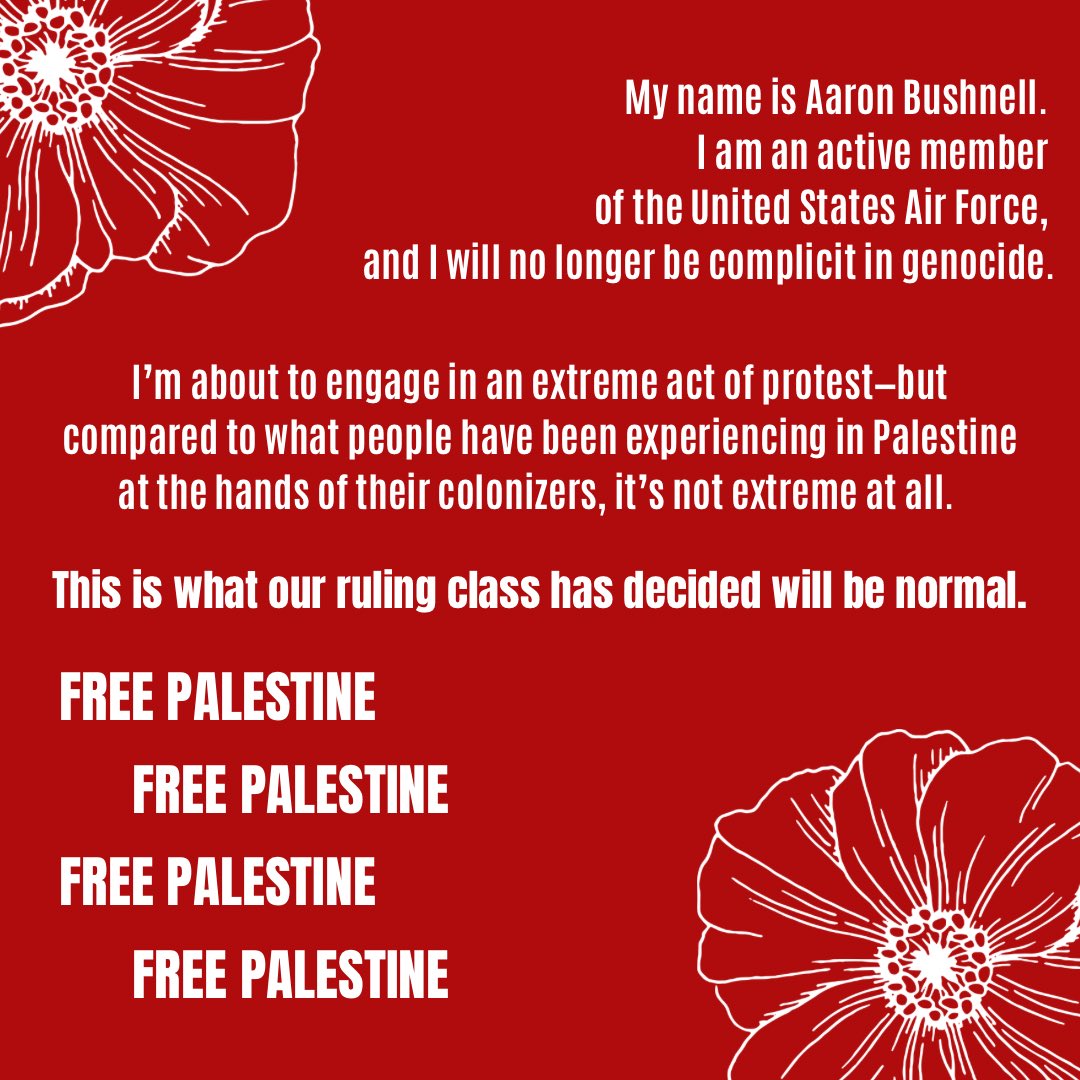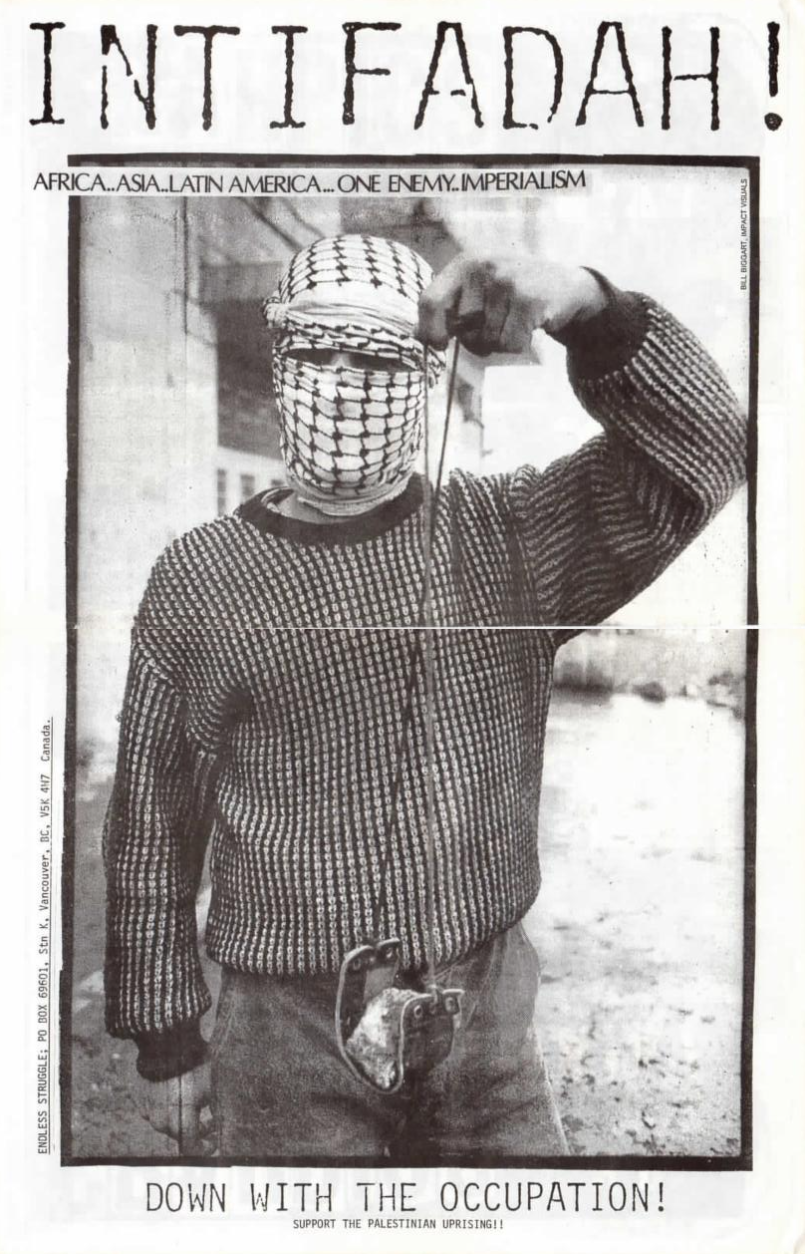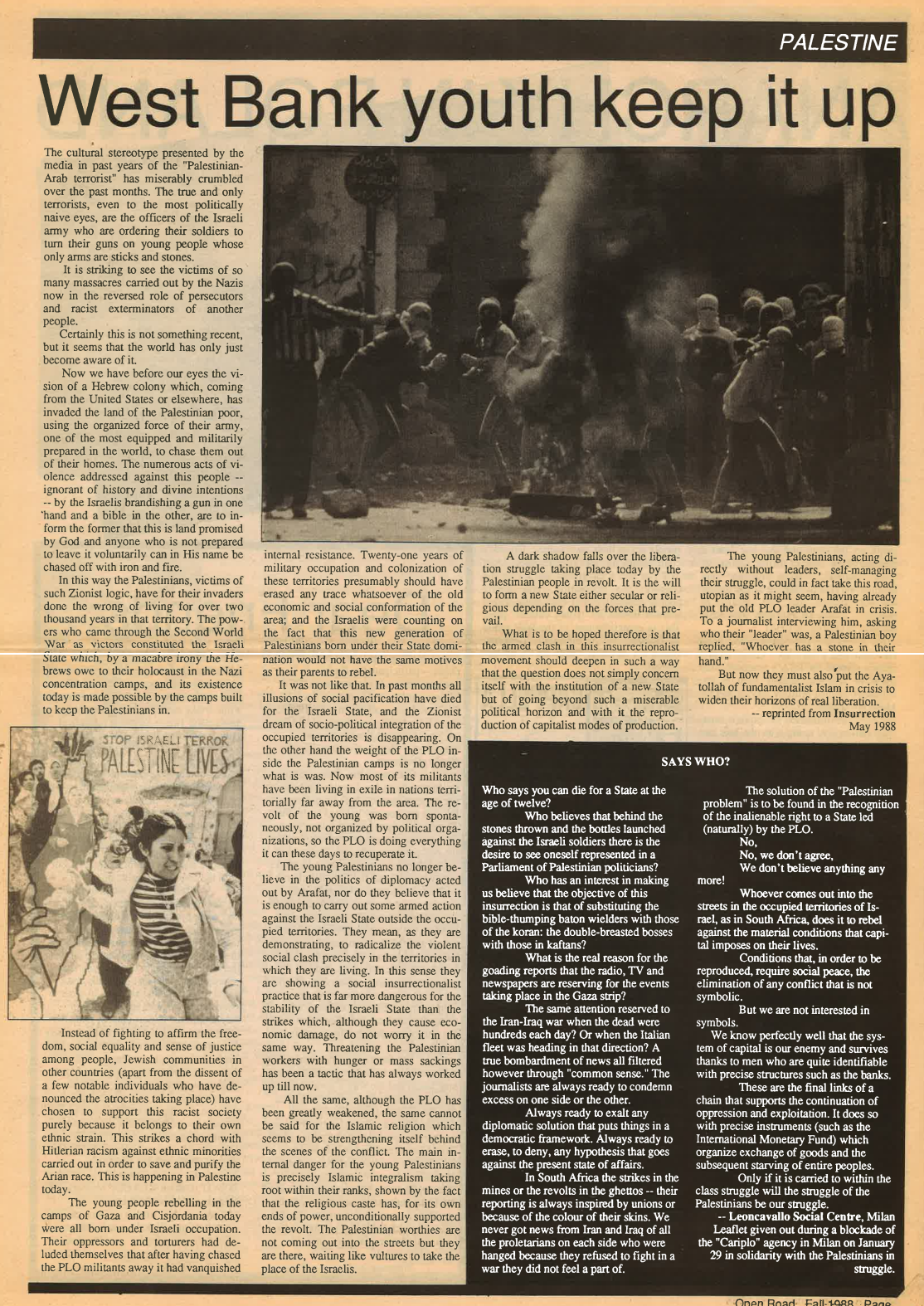Graphic from ‘Endless Struggle‘, No. 10, Summer 1989, Vancouver, BC
Please note that, as with every other section of this site, the republishing of an article or link to a text here is not an endorsement of each and every point made by its author by the editor of this site. It should be noted that in this specific case, the site editor does not endorse, for example, Sam Dolgoff’s statement that the Israeli state needed defending nor Emma Goldman’s statement that European Jewish settlers gained legitimate title to Palestinian lands by mixing their labour with the land (an implicitly Lockean theory). However, links to these texts have been included here to show that anarchists have had differing, even contradictory viewpoints on Palestine, not just outright or impeccable sentiments of solidarity, just as anarchists don’t have a perfect track record when it comes to Indigenous peoples and settler colonialism more generally.
-Ed.
Articles/Excerpts (1899-2025)
“You want to send us to Zion? We do not want to go…”
Some Early Anarchists on Zionism: From Bernard Lazare to Emma Goldman (1899-1939)
“Were the retrogressive ideas of the Jewish Nationalists ever to materialize, the world would witness, after a few years, that one Jew is being persecuted by another.”
National Atavism, from Mother Earth (1906)
“Like a wild cry across the world and like a barely whispering voice in our innermost being, a voice inevitably tells us that the Jew can only be redeemed at the same time as humanity and that it is one and the same: towards the Messiah in exile and dispersion to wait and to be the Messiah of the nations.”
Are These the Words of a Heretic?, by Gustav Landauer (1913)
“Yet, England has in Palestine a base for expansion into Asia Minor and will not give up its policy of protection for Zionism.”
Bloodied Palestine, by Camillo Berneri (1929)
“On the contrary, the greater and stronger the violence grows, the greater our responsibility and duty grows to find the correct cause and determine our diagnosis.”
“It is a mere colony ruled over by British exploiters and rulers.”
The Arab and Jewish Ordeal in Palestine, by Marcus Graham (1936)
“Muslim nationalism tends to emancipate itself from the English yoke. They have ample reasons.”
Blood in Palestine, by Solidaridad Obrera (1936)
“Our internationalist thinking, one hundred percent, induces us to pose the problem of the colonies.”
The Right of Peoples to Determine Themselves, by Solidaridad Obrera (1936)
“We must dictate to Madrid unambiguous declarations announcing the abandonment of Morocco and the protection of Moroccan autonomy. France would anxiously envisage the possibility of insurrectionary repercussions in North Africa and in Syria; Great Britain would see the movements for self-rule in Egypt and among Arabs in Palestine growing stronger.”
What Can We Do?, by Camillo Berneri (1936)
“However, apart from once more exposing Mussolini as the opportunist par excellence, the events in Palestine once more shows that all imperialisms, whether they be democratic or totalitarian are ruthless.”
Terrorism In Palestine: “Democracy” at Work, by Vernon Richards (1937)
“The Arab demand for independence is far from vague in its significance… And we further add that Zionism will not solve the Jewish problems.”
Palestine: Idealists and Capitalists, by Vernon Richards (1938)
“In plain words, a pact was formed during the War between British imperialism and Jewish nationalism, of which the Arabs were to be the victims.”
Palestine and Socialist Policy, by Reginald Reynolds (1938)
“In point of fact I have for many years opposed Zionism as the dream of capitalist Jewry the world over for a Jewish State with all its trimmings, such as Government, laws, police, militarism and the rest.”
Emma Goldman’s Views on Palestine and Socialist Policy (1938)
“‘Finding is keeping’ is a good motto for conquistadores and imperialists, but not, I should have thought, for Anarchists.”
Reg. Reynolds Answers Emma Goldman on Palestine (1938)
“The struggle must be against Imperialism first, against Zionism secondly, and lastly against the bourgeois nationalist government when created.”
Anarchist Tactic for Palestine, by Albert Meltzer (1939)
“The case of Palestine is an up-to-date instance of imperialism and its logical consequences.”
The “Advantages” of British Imperialism, by Reginald Reynolds (1939)
“…having studied the correspondence — I consider the Arabs’ case to be indisputable, the alternative proposition, which is that our promises were ambiguous, is hardly to our credit.”
Conspiracy on Palestine, by Reginald Reynolds (1941)
“But it may be asked, can this particular problem wait? No problem can wait.”
Palestine and the Jews, by Albert Meltzer (1942)
“The Arab workers of Palestine have not yet accepted British rule…”
The Lebanon Crisis, from War Commentary (1943)
“Zionism has become reactionary because instead of being a scheme for immigration, as many at first thought it would be, it became a scheme for colonization, and therefore of imperialism.”
Zionism, from War Commentary (1944)
“…I sold my individuality, part of my life, my skill with arms; and also was expected to commit murder if asked to do so (Palestine Rebellion, 1936).”
Ten Years a Soldier, from War Commentary (1944)
“Those who imagine that racial laws are exclusively something German or South African have yet to come across the most peculiar racial laws of ‘our’ mandate, Palestine.”
Fine Day For The Race, by Albert Meltzer (1947)
“On the other hand, there is no doubt that the majority of Zionists regard the Arabs in the same way as other colonisers have regarded other ‘native inhabitants’…”
Palestine, by Albert Meltzer (1948)
“As the earliest Anarchist criticisms of Zionism said — a new nationalism could only create a State and this would become more reactionary, as witness the decline of Italian nationalism into fascism.”
Middle East Notes: Civil War, from Freedom (1948)
“It is outrageous that the British should add to the sufferings of Jewish refugee immigrants; and it is outrageous that Arab families should be rendered homeless by the partitioning of disputed territories.”
The Israeli Crisis, from Freedom (1949)
“In the face of such obvious Machiavellianism, who is going to claim that the last war was fought for the liberation of Europe from such evils as anti-Semitism?”
Should We Defend Democratic Rights?, by Albert Meltzer (1951)
“The whole point was that in re-drawing the boundaries of Turkish possessions, they wanted an ‘Ulster’ in Palestine and the ‘Jewish Nation’ within a mandated territory suited them very well.”
Chaim Weizmann and Israel, by Albert Meltzer (1952)
“But something must be done, for as long as the recurrent desire for Arab unity struggled with the political and economic handicaps the West had left them with, anything might happen to the precious oil supplies — even the dreaded Communism.”
A US Victory in the Middle East?, by Anne-Marie Fearon (1967)
“The Palestinian question is too serious to be left to the states, that is, to the colonels.”
Two Local Wars, by Mustapha Khayati (1967)
“Can the most lucid elements of the resistance assume this historical role in the ordeals that the masses must pass before their hangmen-teachers in Amman, Lebanon and elsewhere?”
Waiting for the Massacre, by Lafif Lakhdar and Mustapha Khayati (1970)
“Of course, saying that a country is democratic is not to say that it lacks aggression against others, or is a free society, least of all that it lacks police repression: all these things exist in Israel as in other democracies.”
Alternatives to suicide, by Albert Meltzer (1981)
“My relative did make use of her experience years later, when she chose to be a rooter for the State of Israel, at which time she did not renounce her contempt toward the Quechuas…”
Anti-Semitism and the Beirut Pogrom, by Fredy Perlman (1983)
“Every oppressed population can become a nation, a photographic negative of the oppressor nation, a place where the former packer is the supermarket’s manager, where the former security guard is the chief of police.”
The Continuing Appeal of Nationalism, by Fredy Perlman (1984)
“Far from curtailing the concentrated power of the state, the necessity for defense of Israel — freely acknowledged by our comrades — depends upon putting into effect the indispensable military, economic, legislative and social measures needed to keep Israel in a permanent state of war preparation.”
Anarchists in Israel, by Sam Dolgoff (1986)
“The young Palestinians throwing stones at the Israeli army rightly have the sympathy and solidarity of comrades who see them in their just struggle for freedom from their colonial oppressors.”
Breaking out of the Ghetto, by Jean Weir (1988)
“As far as the Palestinian struggle is concerned, we must underline the importance of an insurrectional struggle that has been going on for over nine months, and which is putting one of the strongest armies in the world in great difficulty.”
The Palestinian Struggle Continues, from Insurrection (1988)
“As I watched, what were then daily news reports of the intifada on television, I saw the same brutal oppression of Palestinian rights as I saw in South Africa.”
Rasta time in Palestine, by Benjamin Zephaniah (1990)
“Once freed from the Turks, the Palestinian Arabs did not want to be dominated either by the English or the Zionist newcomers.”
Palestine, mon amour, by Alfredo M. Bonanno (1997)
“From the late 1980s anarchism was central to the politicized section of the punk movement and to army refusal and evasion during the first Palestinian Intifada.”
Anarchism in Israel and Palestine, by Uri Gordon (2009)
“…the obligations and duties of the state became a burden on the back of the revolution, at the expense of liberation.”
Dismantle it and let them fall, by Bassel al-Araj (2012)
“This book is dedicated to the memory of our fallen Palestinian comrades in the popular struggle against the occupation.”
“Canadian police train alongside Israeli state security forces, and have been deployed in numerous imperialist military operations globally.”
“From the side of the global system, we have witnessed so much atrocity and ugliness this past week. The United States sent the ‘Gerald R. Ford’ — the biggest warship ever built — and the UK deployed their royal navy ships to support Israel in the genocide it is committing.”
From the Galilee to Gaza: A Voice from Palestine, edited by CrimethInc (2023)
“Black Rose / Rosa Negra (BRRN) reached out to Fauda, a small group centered in the West Bank that identifies itself as a Palestinian anarchist organization, to get their perspective on the current struggle.”
(See also: Fauda texts at the Anarchist Library)
“For more than 75 years, Palestinians have been waging a liberation struggle against Israel’s settler-colonial project in and outside of Gaza.”
“In response to their world class embarrassment, the colonial state seeks a hundred eyes for an eye, thousands of teeth for a tooth and wages an open campaign of extermination against the Palestinian population they hold captive.”
“But the liberation of Palestine also requires breaking the back of Western Imperialism.”
“We will not pat ourselves on the back and invent victories, especially not when we look at the genocide before us.”
The Boat That Wasn’t Blocked, by anonymous (2023)
“…in the face of the latest barbarity unleashed by Israel upon the Palestinian population, two anarchist-communist organisations in Europe have taken stances that amount to either passivity or tacit endorsement of genocide.”
Palestine, platitudes and silence, by Tommy Lawson (2023)
“This reader has been put together as a guiding stone for fellow anarchists to better understand the conflict in The Levant and the responses of their comrades throughout the past hundred years.”
A Palestine Reader (incomplete), by Seditionist Distribution (2024)
“Our grief can go to anyone. Our solidarity must go to the oppressed.”
“Since before the establishment of the Israeli state, Israel has been a racist, colonialist society, premised on the notion that Israelis are fundamentally superior to Palestinians.”
Human Rights Discourse Has Failed to Stop the Genocide in Gaza, by Jonathan Pollak (2024)

“Aaron will live forever. I know this, because everyone who was loved by Aaron will carry a bit of him in their soul, and everyone who witnessed his sacrifice will carry him in their minds.”
Memories of Aaron Bushnell as Recounted by His Friends, edited by CrimethInc (2024)
“[Aaron Bushnell’s] death is already drawing unprecedented attention, at new levels, to the cause of Palestinian liberation, and likely to anarchism as well.”
“On Feb 25, Aaron Bushnell, an active duty airman for the US Airforce, lit himself on fire in front of the Israeli Embassy.”
Topic of the Week: Martyrdom (starting at 22:19), w/ Vail, Petra & Margaret! , by ANews podcast
“In this episode, first we speak with several anarchists and mutual aid organizers in so-called San Antonio, Texas about their late friend, Aaron Bushnell.”
“This text goes a little way towards sketching anarchist perspectives on this historical and political conflict.”
(Note: To my knowledge, Emma Goldman was never the editor of Spain and the World, only a contributor, its actual editor being Vernon Richards and publisher being Lilian Wolfe, contrary to what is claimed in Zurbrugg’s article. -Ed.)
“The beginning of every revolution is an exit, an exit from the social order that power has enshrined in the name of law, stability, public interest, and the greater good.”
Exiting Law and Entering Revolution, by Basel al-Araj (translated 2024)
“Now, seven months into the genocidal war waged by Israel, there is not a single college or university left standing in Gaza.”
May Day 2024: Remembrance Through Action, by the Black Rose Anarchist Federation (2024)
“The Palestinian solidarity campaign has also brought broader attention to the Australian war industry.”
May Day Statement 2024, by Geelong Anarchist Communists (2024)
“We discuss the organisations built by Palestinian workers, the 1936-39 revolt, and a number of joint strikes by Arabs and Jews which happened against the backdrop of rising tensions which culminated in the ethnic cleansing of the Nakba.”
Class struggle in Palestine, by the Working Class History podcast (2024)
“The chief goal is the mass slaughter of children, targeting Gaza’s future. Of the 41,000 deaths reported thus far, about 16,500 are children.”
“He [Aaron Bushnell] had not been passive in the first place, so he was not breaking from his passivity, he was breaking from his complicity, as he himself told us.”
Clarity Contra Complicity, by K. C. Sinclair (2025)
“…there can be no revolutionary defeatism for Palestinians as long as Israel invades and occupies their lands, nor, for that matter, for Ukrainians with regard to Russia’s invasion and attacks.”
Anarchism and Revolutionary Defeatism, by K. C. Sinclair (2025)
Excerpt from Nino Napolitano’s ‘La Rivolta Degli Arabi’ (1929)
“To us, the fate of the Arabs persecuted by the infamous usurper calls us to protest, equal to that which we were called against the imperial Little Father for the pogroms against the Jews. Certainly, indeed surely, behind the Arab people who pay the price for their irreducible idea of autonomy, there will be those who caress a wish for domination; but as people we feel the need to protest against the infamous [British] Empire that persecutes and starves them.”
Nino Napolitano, La Rivolta Degli Arabi, L’Adunata dei Refrattari, Oct.5, 1929, Newark
Excerpt from Albert Meltzer’s autobiography, ‘I Couldn’t Paint Golden Angels’, and his chapter, ‘Bounty on the Mutiny‘ (1996)
“The [British] Army [in 1947] was in a virtual state of war with the Jews in Palestine when Ernest Bevin, having stated firmly he was determined to hold on to the colonial mandate, suddenly abandoned it in the face of terroristic attacks by a section of Zionists. The [British] forces, who had no real interest and no ideological excuse for being there, were totally disillusioned with the whole set-up. There were anti-semitic songs going round about ‘The holy but now hostile land’. It did not affect us, now in Moascar [Egypt], except that a group of deserters known as the Schofield Gang were active buying and selling arms, while in Cairo itself many local Jewish agents were buying arms from Egyptian and British soldiers alike and smuggling them over.
I did my best to persuade people not to become involved. For a few quid it wasn’t worth it, though very tempting for soldiers who had been rebuffed for years or whose services had been devalued by detention.”
Albert Meltzer, 1996
(Click on the image to enlarge)
Vancouver’s ‘Open Road‘ anarchist journal reprints (under a different title and with different photos) ‘The Struggle in Palestine‘ from Insurrection: Anarchist Magazine, 1988, London, UK
Non-Anarchists on Aaron Bushnell’s Action
(In reverse chronology)
Unlocking the ‘Mystery’ – Ilan Pappé Writes In Memory of Aaron Bushnell
Palestinian town of Jericho names street after US soldier who set himself on fire
Aaron Bushnell was my friend. May he never be forgotten, by Levi Pierpont
Burnt Offerings: Aaron Bushnell and the age of immolation, by Erik Baker
Taking Aaron Bushnell at His Word (and Deed), by Lyle Jeremy Rubin
Why Would Anyone Kill Themselves to Stop a War? On Aaron Bushnell and Others, by Ann Wright
US airman dies after setting himself on fire outside Israeli embassy, by Al Jazeera
Non-anarchist sites/resources/texts
About Face: Veterans Against The War
Palestine Children’s Relief Fund
Companies Profiting from the Gaza Genocide, by the Action Center for Corporate Accountability
The Class Nature of Israeli Society, by Haim Hanegbi, Moshé Machover and Akiva Orr (1971)
Collections/Articles on this site
Palestine (some collected links)
If We Must Fight, Let’s Fight for the Most Glorious Nation, Insubordination
Anarchists on National Liberation



One reply on “Anarchists & Fellow Travellers on Palestine”
Anarchists Against the WallDirect Action and Solidarity with the Palestinian Popular Struggle
https://theanarchistlibrary.org/library/uri-gordon-and-ohal-grietzer-anarchists-against-the-wall